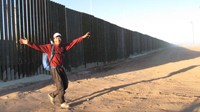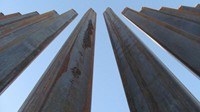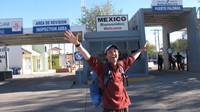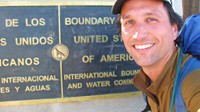I have walked into the town of Palomas, Mexico and thereby completed my CDT yo-yo! The final three miles is an  unglamorous road walk on a busy paved road where your main company is rumbling 18 wheelers filled with products either coming or going to Mexico.
unglamorous road walk on a busy paved road where your main company is rumbling 18 wheelers filled with products either coming or going to Mexico.
When I had one mile to go a southbound driver yelled out. “Amigo! You need a ride to Mexico?”
I smiled, shook my head, and yelled back, “Where the hell were you when I was in Canada!?”
He laughed and said, “You’re a funny Gringo!” He drove on and I pounded out the final mile.
The wall
Locals tell me that the border was incredibly porous until the US government built a massive wall there just two months ago.
“Mexican buses went along the border and emptied out a bunch of Hispanics who waltzed across the border,” said one local. “Ever since that damn wall went up, we rarely see illegals.”
“Isn’t that a good thing?” I asked.
“No!” she exclaimed. “They would crawl under the old fence and work on my adobe wall for cheap. Now finding inexpensive labor is tough. We don’t make money here, so we really need the Mexicans to help us make ends meet. Our town is getting much less business, jobs are hard to find as a result, and the economy is depressed. People from all over Mexico used to go to Palomas to party and many snuck across the border and spent their pesos here. Now both Palomas and Columbus are in a deep recession. And that stupid wall won’t completely shut them out either! What a waste of time and money!”
I walked across the border, took the victory photos, ate a burrito in Mexico to help their economy, and hitched back to El Norte.
My mind was working overdrive during my last few hundred miles of trail, favoring my final moments on the CDT. Here are some of my thoughts:
The world is digital
Conventional wisdom is that nature is analog and artificial stuff is digital. However, I’ve concluded that nature is digital.
We think of a stream of water as analog. In other words, like a volume knob, the flow can slowly increase or decrease. It’s not either on or off like a power switch. However, once we zoom into the stream we discover that it’s made up of discreet and individual molecules. And those molecules are composed of discreet elements (two hydrogen atoms and one oxygen atom). Since an atom is just a discreet entity and everything is made of them, the entire universe is digital.
Since each atom represents a bit of information or data, does that mean that the universe is a computer? Indeed, when groups of atoms form molecules, it’s like digital information clumping together to make the words you’re reading on the screen now. Then they disassemble and go off to form other stuff.
Wouldn’t it be funny if this whole universe is a giant science experiment in some lab? Perhaps the Experimenters have a lab that is observing dozens of universes, each with their own laws of physics.
In some universes time might run “backwards,” with an effect preceding the cause. For example, there you would see a broken glass and then watch it fly up and re-assemble on the table. Dead things would crawl out of the ground, live their lives “backwards,” and then enter the womb and disappear. There might be someone walking the CDT “backwards” and contemplating if a universe could exist where time went “backwards” (from his perspective). He would write an email (with words disappearing at each stroke) and his readers would find such a universe (like ours) incomprehensible.
Fragile vs. tough life
One of the marvels I’ve been contemplating lately is the juxtaposition between how fragile and how tough life is. While I am walking in high alpine environments, I admire the delicate flowers that, with one step, can be crushed out of existence. However, those same flowers survive a frigid winter, where temps hover at -40 degrees and the wind blows ferociously across the mountain tops.
Similarly, desert life needs those few drops of rain or dew to make it through the summer or else they wither and die. Their fragile, precarious existence seems so delicate and fleeting. However, try to yank out some of those shrubs! They’re tough!
Bacteria are amazing too. When I scoop up a bit of forest soil I’m holding millions of bacteria that are making a living there! Indeed, of all living things, bacteria seem to be the toughest species around.
Throughout the CDT this dichotomy of fragile life and tough life has entertained me. I’m confident that our universe is filled with life everywhere. It clings desperately to anywhere it can survive and uses all its powers to proliferate.
And now I’ll share my final thought that I’ve mulled over during the last 6.5 months…
Why we’re alone in the Universe
The New Mexican wilderness is heaven for the stargazer. I always hiked at night, marveling at the Milky Way, wondering if in the trillions of stars there was a planet where another traveler was gazing right back at me, thinking the same thoughts that I was. I’m sure life is plentiful in the universe and I’m confident that we’ll find things making a living in our solar system (like on Mars, Europa, and Titan).
However, we’re probably the only intelligent, technologically advanced life out here.
I would have never made such a statement before the CDT. I’ve always believed that there are surely many intelligent, technologically advanced alien species roaming the universe. Now, I doubt this is true. Here’s why…
- The universe is 13.7 billion years old.
- The earliest stars were born when the universe was just 200 million years old.
- Our sun was born 5 billion years ago.
- Therefore, for 8.7 billion years, other stars were getting created and dying.
In short, trillions of solar systems had a huge head start over our solar system. The implications are mind blowing…
It’s hard to imagine how life will be in 100 years from now. Certainly those who lived 100 years ago would be surprised at how the world has turned out today. Jules Verne, one of the premier science fiction writers of the last century, wrote a short story called “In the Year 2889” where most of predictions have already came true, nearly 800 years ahead of his schedule.
It’s impossible to imagine life 1,000 years from now. If we assume we haven’t blown ourselves up, we’d hardly recognize ourselves. Now try to imagine how advanced we would be in a million years? You can’t. No one can. Now try to conceive a technologically advanced civilization that has had a billion years to evolve. Ugh.
Most astronomers believe that it only took about 200 million years after the Big Bang for the first stars to emerge. So we weren’t the first stable solar system to emerge. If others emerged and intelligent life evolved, then they would be millions and perhaps even billions of years ahead of us.
As Arthur C. Clarke said, “Any sufficiently advanced technology is indistinguishable from magic.”
Indeed, such an advanced civilization could travel the vast distances of space with little difficulty. Yet they’re not here. At least, they’re not visible to us. Maybe they’re the dark matter and dark energy that physicists have recently found makes up most of the universe.
Although it’s impossible to fathom how such an advanced civilization thinks, I’d expect that their basic desire to copy themselves and expand, which they inherited from their ancestors, would still be there. If so, then that means that they would want to expand far and wide. If so, then they could easily be able to do just that, thanks to their advanced technology.
Therefore, after walking nearly 6,000 miles and thinking about it, I’ve concluded that:
- Life is everywhere it can be in the universe.
- Intelligent life is common also, depending on how one defines “intelligence.” (Some think a rat is pretty intelligent and that President George W. Bush is not.)
- Technologically advanced life is exceedingly rare and such civilizations destroy themselves before they are able to expand very far.
I realize that the universe is a big place and that any advanced civilization could be kept quite busy colonizing millions of galaxies before it bothered to come to our lonely outpost in the Milky Way. However, exponential growth is a marvelous thing and it would allow for a rapid expansion over millions (or billions) of years. An advanced civilization could afford to send trillions upon trillions of probes to explore the universe for them, reporting on suitable places for habitat (or places that could be transformed).
I’m still hopeful that we’re not alone. Sometimes when I gaze at the Milky Way, I imagine seeing black holes, supernovae, and star birth. I imagine that all those phenomena are not random in nature, but rather are deliberately caused by alien civilizations. In galactic wars, aliens could fling asteroids to each other’s planets and destroy them. They could create or move a black hole to swallow up a competitor. They might create stars or explode old ones to suit their species. Although all this sounds crazy, I’ve seen how our species has moved mountains and diverted streams. With sufficient power, we’ll move planets and divert stars. It may take us a few million years to get there, but we will, assuming we won’t blow ourselves up.
That leaves me to my final point: it’s quite possible (and lately I’ve believed quite likely) that we’re the only technologically advanced species in the universe. Therefore, as individuals, we should do everything we can to advance our species and protect our species. That not only means protecting our habitat, the Earth, but also cherishing our fellow Homo sapiens. We’re all interconnected, we all come from the same stardust, and we share atoms with each other.
Use your time on this precious planet wisely. Love all humans, even if they look different, talk in another language, or smell funny. And most of all, every now and then, treat yourself to some ice cream.
Happy trails,
Francis Tapon
Sponsor spotlight: All sponsors
I encourage you to visit my sponsor's websites to find out all the wonderful companies that helped make this journey a reality. These generous companies contributed in many ways to help make this odyssey successful! Thank you!
Also, thank you to all those who have sent me emails or voicemails of encouragement along the way. It helped put steam to my stride.



